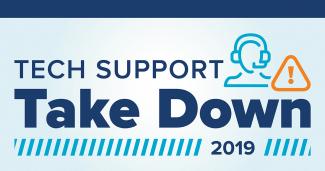5 Tips to Avoid Computer Tech Scams
Do you get pop-up messages on your computer screen that tell you to call tech support? Ignore them—it’s likely a scam! The Federal Trade Commission received more than 175,000 complaints in 2017 from consumers who were scammed by callers claiming to be computer technicians.
To protect District residents, AG Racine has joined a nationwide effort to stop these fraudsters who try to trick consumers—often seniors—into buying costly tech support and repair services.
How the Tech Scam Works
Scammers use phone calls and online ads resembling security alerts to trick consumers into providing access to their computer. The scammers will claim the consumer’s computer is infected with a virus or is experiencing other problems and then pressure the consumer into buying unnecessary computer repair services, anti-virus protection, or other products and services.
These scammers often sell services that are already available for free, “fix” a problem that doesn’t exist, or install a harmful “malware” program on the computer.
Tips to Protect Yourself from Tech Scams
There are tech support services out there that can help with computer problems, but make sure you do your research and are using legitimate sources. Here are some tips to avoid being scammed:
- Don’t respond to unsolicited messages: If you get a pop-up message, phone call, spam email, or any other urgent message about a virus on your computer, DON’T click on any links or call a phone number. Legitimate companies do not reach out to you unexpectedly about a problem with your computer.
- Use companies you know and trust: Tech support scammers try to get their websites and services to show up at the top of search engine results—it might even be a sponsored ad. Use companies you trust or have worked with in the past.
- Do not give anyone control of your computer: Only allow a technician who you know works for a legitimate company ever take control of your computer.
- Keep your security software up-to-date: The best way to know your computer is virus-free is to keep your security software updated. Some companies offer free antivirus and firewall software.
- Report a scam: If you are a victim of a tech support scam, contact OAG’s Office of Consumer Protection at (202) 442-9828 or consumer.protection@dc.gov, or submit a complaint online.
The Office of the Attorney General works to educate District residents about their consumer rights, responds to individual consumer complaints, and takes appropriate law enforcement action when possible. Learn more about your rights and how to protect yourself against scams at oag.dc.gov/ConsumerProtection.

